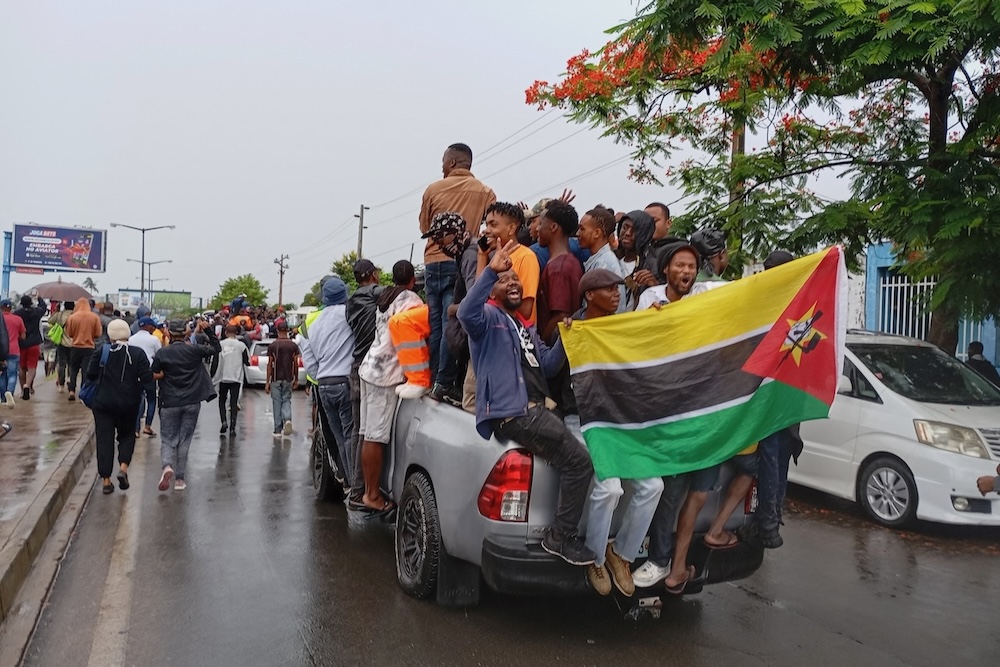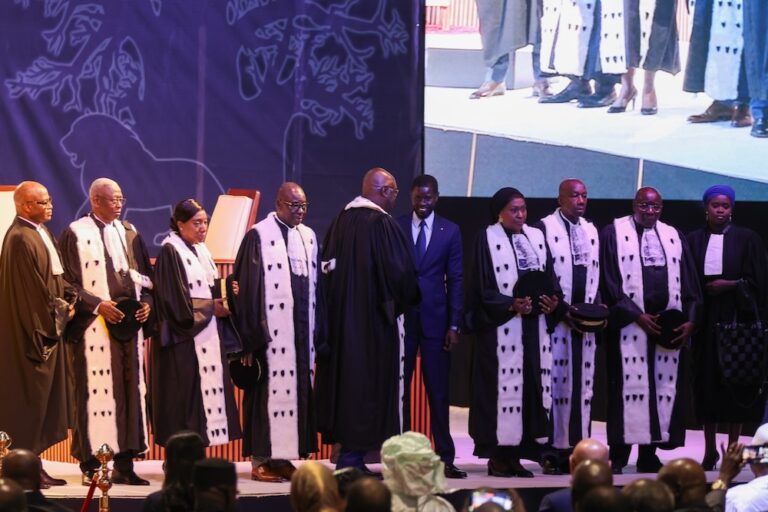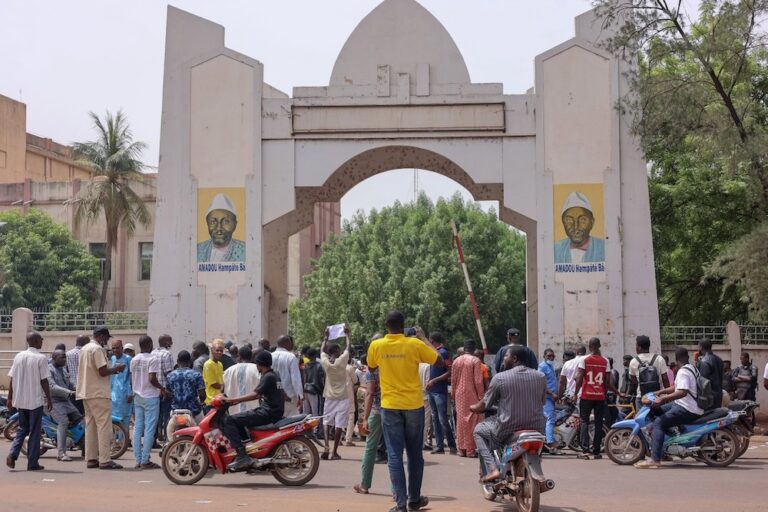IFEX December 2024 brief: Regional Editor Reyhana Masters takes a deep dive into the issues that dominated the electoral landscape in some of the countries that held elections across the continent in 2024.
“Elections are a litmus test of civic space and of effective governance. States and societies cannot afford to fail this test.”
Volker Türk, United Nations High Commissioner for Human Rights
IFEX has been highlighting the connections between the key rights to freedom of expression and information that the network promotes and defends, a robust civic space, and healthy elections. At the end of December 2024, Africa drew the curtains on a mammoth election year – one that unveiled a complex tapestry of challenges shaping electoral landscapes in diverse and dynamic ways across the continent.
Eleven of the 17 countries scheduled to have elections in sub Saharan Africa managed to hold them – albeit conducted on a varied scale of the electoral integrity barometer. Elections in Burkina Faso, Mali, South Sudan, Guinea, and Guinea-Bissau were postponed, underscoring the persistent challenges in these regions. However, countries including Senegal, South Africa, Botswana, Namibia, Mauritius, Ghana, and the self-declared Republic of Somaliland managed to conduct elections, that were broadly seen as credible, competitive, free, and fair – though not without issues.
It is becoming evident that electoral integrity is eroding in several countries, and the protection of human rights and fundamental freedoms are increasingly at risk. In many countries, the constriction of civic space, erosion of media freedom, internet shutdowns, newly crafted legal restrictions, imprisonment of opposition politicians, hate speech targeting fissures in society, and escalating smear and disinformation campaigns created a tense and skewed political landscape. In some, disputed results further fuelled unrest, leading to violent crackdowns on post-election protests.
The Ibrahim Index of African Governance review of the 2024 elections noted that “Around the world, trust in democratic institutions and processes is fading. Social cohesion and the social contract between the government and the people they serve is also weakening. Many people feel ignored, like democracy has not fully delivered its promise.”
Here is a snapshot of some of the elections that took place in 2024 across the continent.
Mozambique
Possibly the most contentious election of the year was in Mozambique.
Even now, months after the announcement of results of the presidential and general elections, the situation remains tense and volatile.
The political ecosystem has been largely dominated by the ruling party, Frente de Libertação de Moçambique (FRELIMO), which has been governing with a growing sense of entitlement and impunity. Over the years, this situation, coupled with internal power struggles, left the main opposition party, Resistência Nacional Moçambicana (Renamo), weakened and divided, as reported by the International Crisis Group. In contrast, the “Optimistic Party for the Development of Mozambique” (PODEMOS), established by a splinter group from FRELIMO, gained strong support among Mozambique’s youth. The party offers a solution to FRELIMO dominance, especially with the inclusion of independent Venâncio Mondlane as their chosen presidential candidate.
When early results indicated yet another extension of FRELIMO’s dominance, citizens took to the streets to voice their objections. The demonstrations intensified following the brutal killings of Paulo Guambe, a parliamentary candidate and PODEMOS party official, and Elvino Dias, the attorney for opposition presidential candidate Venâncio Mondlane, who was preparing a legal challenge against the election results. The protests gained further momentum when the country’s election commission declared Daniel Chapo and his ruling party as the winners of the election.
As Human Rights Watch (HRW) reported, the response to the protests by authorities was swift and violent. “Security forces killed at least 11 people and injured dozens of others using live bullets and tear gas during post-election protests across the country.” A few days later, the internet was interrupted.
Even before voters went to the polls on 9 October, numerous rights organisations had noted that civic space had been in a chokehold.
HRW highlighted the growing harassment, threats, and attacks on journalists, activists, and opposition party members. Two years earlier, during their four-day visit to the country in 2022, an International Press Institute delegation expressed their concern: “about increasing restrictions on press freedom and the shrinking space for independent journalism in the country,” indicating that their conversations during that week had “shown that independent journalism is under significant pressure and that urgent action is needed in order to prevent further deterioration of press freedom and to safeguard democracy in Mozambique.”
The situation is complex and volatile, and the problems multifaceted in this nation of 35 million people.
As a guest writer points outs in The Conversation: “The country is fragmented. The government has neglected the development of inclusive, accountable governance and equitable infrastructure. Regional disparities are the result. This lack of unity and long-term planning has created a fragile state unable to withstand mounting internal and external pressures.”
Comores
The continent’s electoral round for 2024 was kickstarted by presidential elections on 14 January in the Comores – an archipelago made up of three islands on the east coast of Africa situated within the Mozambique Channel. On 18 January, the Independent National Electoral Commission (CENI) declared Azali Assoumani the winner, with 62.97% of the votes, allowing him to secure his fourth five-year term. With only 16.3% of registered voters participating, the win translated to President Assoumani assuming “a mandate to govern with just 33,209 of his people formally backing him.”
Opposition leaders claimed electoral fraud and accused the CENI of bias towards the ruling party. Despite these allegations, the commission maintained that the election was transparent. Protests erupted almost immediately, prompting the government to impose a curfew and an internet shutdown. Very soon after, the main opposition candidate, Daoudou Abdallah Mohamed of the Orange Party, took the issue to the country’s Supreme court pleading with it “to annul the elections due to election malpractice and order the electoral authority to hold fresh elections.”
Public dissatisfaction with the electoral process in Comoros has deep roots that date back to a 2018 referendum, which was at the center of constitutional changes that gave Assoumani the opportunity to circumvent term limits. The amendments were also instrumental in breaking apart the 2001 Fomboni Agreement – a pivotal accord that had established a power-sharing system, rotating the presidency among the three main islands.
As Comores was bracing itself for parliamentary elections on 12 January 2025, opposition parties had already expressed their intention to boycott. The struggle for freedom of expression and democratic governance remain at the forefront of the nation’s challenges.
Botswana
The highpoint of the electoral calendar was the seamless and peaceful transfer of power in Botswana, following the shocking outcome of the October presidential and parliamentary elections. Incumbent president Mokgeetsi Masisi of the ruling Botswana Democratic Party (BDP) handed the reins of power to Duma Boko of the Umbrella for Democratic Change (UDC) coalition, stating: “I am proud of our democratic processes. Although I wanted a second term, I will respectfully step aside and participate in a smooth transition process.”
The loss of power by the BDP, which had governed for just under six decades, was one of the most significant reversals on the African continent. Numerous factors contributed to this dissatisfaction with former president Masisi and his administration, with corruption being the primary reason. An issue under Seretse Khama’s presidency (1966 to 1980), which had remained unaddressed, was the weakening of oversight institutions, which ultimately allowed corruption to go unchecked. Although President Masisi had attempted to distance himself by admitting there was maladministration within his government and that many ministries were weak, rumours critical of his own conduct persisted. Allegations included the misuse of government resources and claims that family members received substantial government contracts. According to The Conversation: “he was accused of interfering in judicial matters too.”
The deciding factor was the deterioration of living conditions and the high rate of unemployment. This pushed the majority of voters to opt for the promises made by the UDC around job creation, decent housing, a higher minimum wage, and better pensions.
In his analysis, writer and civic leader Kevin Mofokeng highlights how the defeat “symbolized a breaking point in the public’s patience with a party that had grown complacent and, at times, seemingly detached from the everyday struggles of the average Motswana.”
Namibia
Namibia’s polling day went largely unnoticed, both across the African continent and internationally, until the results revealed a historic outcome. Ruling party stalwart Netumbo Nandi-Ndaitwah’s victory marked a significant milestone as she became the country’s first female leader, further extending the South West Africa People’s Organisation’s (SWAPO) 34-year hold on power.
Historically, Namibia has been recognised as one of the most stable democracies in Africa, with previous elections considered credible. However, the general elections scheduled for 27 November had to be extended for an extra two days due to numerous technical and logistical problems. The shortage of ballot papers, as well as malfunctioning electronic tablets for voter identification, resulted in long queues that persisted into the early hours of the following day. Although polls were supposed to close at 9pm on voting day, those already in line were permitted to vote, in accordance with Namibia’s electoral law.
The extension of the voting into the weekend was immediately opposed by the head of the Independent Patriots for Change (IPC) party, Panduleni Itula, who stated: “the rule of law has been grossly violated, and we cannot call these elections by any means or measure as free, fair, and legitimate.”
Just two weeks later – on 9 December – the IPC filed a legal challenge seeking access to detailed tallies of all ballots cast and counted during the election period. The party cited concerns about irregularities and discrepancies in the voting process.
As Graham Hopwood, the executive director at the Institute for Public Policy Research, observes: “If the opposition wishes to substantiate claims of voter suppression, they will need to present detailed statistical evidence and collect testimonies from affected voters to build a credible case.”
“What’s indisputable is that the ECN’s mishandling of the election has deeply eroded public trust in Namibia’s democracy. What happens next as regards to the commission and its senior staff will have to wait until any legal challenges around this election have been resolved.[…] But what is clear is that aspects of the Electoral Act of 2014 will need to be overhauled. Principally, this concerns moving away from the notion that Namibia is ‘one constituency’ and that people can vote wherever they like.”
Mauritius
Mauritius’ reputation as a beacon of democracy took a hit as the November 2024 election was held against the backdrop of a scandalous wiretapping scandal resulting in the subsequent disruption of the internet just days before people went to the polls.
This was then followed by a landslide victory for Mauritius’ opposition coalition, the Alliance of Change, resulting in its leader, Navin Ramgoolam, being appointed prime minister and the party securing all the seats in parliament.
Roukaya Kasenally – an associate professor in Media and Political Systems, University of Mauritius – attributed the opposition’s victory to: “political fatigue clearly play[ing] a part in the trouncing,” alongside a few other factors, including: erosion of public trust in the independence and autonomy of the country’s electoral management body; murky political party financing arrangements; nepotism and cronyism; ineffective implementation of anti-corruption laws; appointment of favoured individuals for key positions rather than selection of candidates based on capacity and competency; and a decline in strength and effectiveness of key institutions, including parliament, the police, and segments of the judiciary.
Kasenally also observes that the former government “will be remembered for a shift towards repression. Mauritius lost its status as a liberal democracy under Jugnauth and has become an electoral autocracy – a country where the government maintains tight control over political power. … A culture of censorship and self-censorship has grown. Journalists, citizens and opposition parties have been harassed and there’s been increased citizen surveillance.”
In brief
In Guinea, on the eve of 3 December, the managing director of the news website Le Révélateur 224, Habib Marouane Camara, was attacked and abducted “by men in gendarme uniforms” reported the Committee to Protect Journalists. Reporters Without Borders has called “on the Guinean authorities to shed light on this “kidnapping” and [is asking] for the journalist’s immediate release.”
On 16 December, Sandra Muhoza – a Burundian journalist for the online media La Nova Burundi, who had been detained since April – was sentenced to a hefty 18 months in prison. The verdict is being seen as part of a broader crackdown on press freedom.



